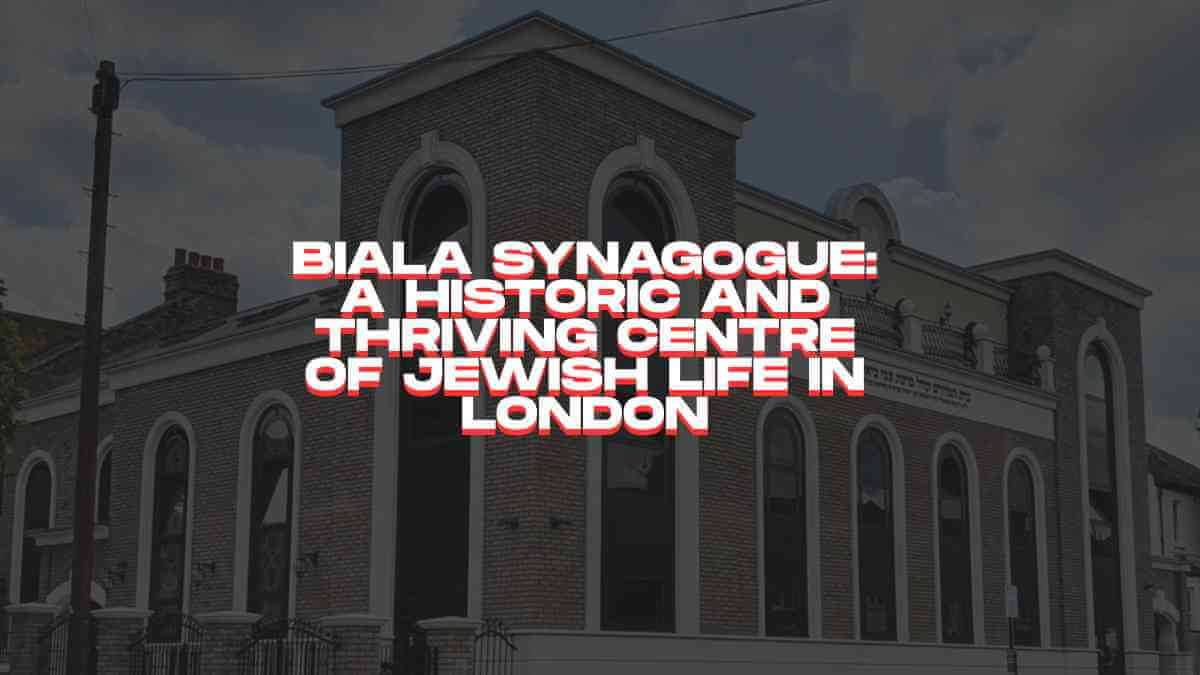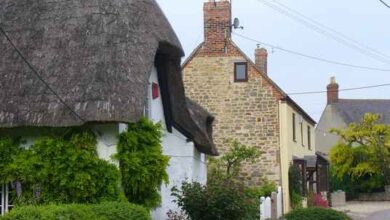Biala Synagogue: A Historic and Thriving Centre of Jewish Life in London

Biala Synagogue is one of the most respected centres of Orthodox Jewish worship and community life in London. Located in the heart of Stamford Hill, Hackney, it represents not just a place of prayer but a hub for tradition, education, culture, and belonging. For many in the Jewish community, the synagogue is more than bricks and mortar; it is a spiritual home where families gather, young people learn, and the elderly find comfort and companionship. The legacy of Biala Synagogue stretches back to the early twentieth century, deeply rooted in the traditions of the Biala Hasidic dynasty, and it continues to serve as a vital part of Jewish heritage in the United Kingdom.
Historical Background
The origins of Biala Synagogue are tied to the Biala Hasidic movement, which emerged from Poland in the nineteenth century. Followers of this dynasty carried their traditions into the diaspora, with many settling in London after the Second World War. During the 1940s, the first Biala congregation in the city was based in Dalston, at 10 St. Mark’s Rise. This early community thrived for over two decades before closing in the 1960s.
The story, however, did not end there. In the early 1990s, the Biala Hasidic presence re-emerged strongly in Stamford Hill, an area already known for its flourishing Orthodox Jewish life. A new Biala Beth Hamedresh was founded on Castlewood Road, and later, the congregation expanded to the current synagogue site at Moundfield Road. This rebirth ensured that the traditions of Biala Hasidim would remain firmly anchored in the capital.
Location and Community Setting
Stamford Hill, where Biala Synagogue is located, has long been associated with Orthodox Judaism in Britain. The area boasts one of the largest Jewish populations in Europe, with streets lined with kosher bakeries, Jewish schools, and religious institutions. Within this environment, Biala Synagogue has carved out a distinct identity as a gathering place for prayer, study, and celebration.
The location is accessible, with Stamford Hill and South Tottenham railway stations nearby, making it easy for worshippers from across London to attend. The synagogue is situated among residential neighbourhoods, allowing families to walk to services in accordance with Sabbath observance. Its placement reflects the balance between tradition and practicality, serving both local members and those who travel from other boroughs.
Religious Affiliation and Practices
Biala Synagogue is firmly rooted in Ashkenazi Orthodox Judaism and operates under the guidance of the Union of Orthodox Hebrew Congregations. Daily life at the synagogue revolves around the rhythm of Jewish law and tradition, with prayers held several times each day, alongside Sabbath services and festivals.
The community is deeply connected to the teachings of the Biala Rebbes, spiritual leaders who trace their lineage back to Poland. These teachings emphasise devotion, joy in worship, and a strong sense of communal duty. The synagogue’s religious life reflects these values, with vibrant services, spirited singing, and opportunities for Torah study. The warmth of the congregation has often been highlighted by visitors, many of whom remark upon the inclusive and welcoming atmosphere.
Architectural Development
A significant milestone in the synagogue’s story has been the creation of a new purpose-built facility. Designed to meet the needs of a growing community, the modern complex combines traditional aesthetics with contemporary design. Natural stone, exotic woods, stained glass, and high-quality finishes lend the building a sense of dignity and beauty, while advanced systems ensure comfort and accessibility.
The new centre includes a spacious main prayer hall, areas for communal gatherings, a mikvah for ritual purification, and catering facilities. These additions underline the synagogue’s role as more than a place of prayer. It is also a hub for life-cycle events such as weddings, bar mitzvahs, and communal celebrations, all of which strengthen ties within the community.
Education and Cultural Role
One of the most important contributions of Biala Synagogue is in the field of education. The synagogue supports religious instruction for children and adults alike, providing classes in Torah, Hebrew language, and Jewish law. Young members are encouraged to engage actively with their faith, ensuring that traditions are passed on to future generations.
In addition to formal learning, the synagogue fosters a culture of knowledge through its well-stocked library of religious texts. Members often gather to study together, discuss religious questions, and share interpretations. This intellectual exchange enriches the spiritual life of the congregation and deepens connections among members.
Inclusivity and Accessibility
Biala Synagogue is notable for its commitment to inclusivity. The building is fully accessible, with wheelchair-friendly entrances, seating, toilets, and parking spaces. This ensures that all members of the community, regardless of age or physical ability, can participate fully in worship and events.
Moreover, the synagogue has cultivated a reputation for hospitality. Visitors describe the warm welcome they receive, from shared coffee after services to friendly conversations in the communal areas. This openness enhances the sense of belonging and demonstrates the values of kindness and mutual respect at the heart of Jewish teaching.
Charitable Work and Trust
The synagogue is overseen by the Biala Synagogue Trust, a registered charity dedicated to advancing Orthodox Jewish religious education and providing support for communal activities. The Trust manages the synagogue’s financial and administrative affairs, ensuring that resources are used effectively for the benefit of the community.
Reports indicate that the Trust raises significant funds through donations and contributions, reflecting the generosity of its members. These funds are directed towards running the synagogue, supporting education, and maintaining facilities. The existence of such a strong financial structure highlights the community’s commitment to sustainability and long-term growth.
Festivals and Celebrations
Festivals hold a central place in the life of Biala Synagogue. The High Holy Days, including Rosh Hashanah and Yom Kippur, draw large congregations who gather in deep reflection and prayer. Passover, Sukkot, and Shavuot are observed with joy and reverence, often accompanied by communal meals and events that strengthen bonds among members.
During Purim, the synagogue becomes a place of celebration, with readings of the Megillah, costume parades, and the giving of charity. Hanukkah is marked with candle-lighting ceremonies and festive gatherings. These events reflect the vitality of Jewish life and the synagogue’s role in sustaining it.
Role in Stamford Hill’s Jewish Identity
Stamford Hill is often described as the epicentre of Orthodox Judaism in Britain, and Biala Synagogue plays a crucial role in maintaining this identity. Alongside other synagogues, yeshivas, and institutions, it contributes to the distinctive character of the area, where Jewish life is visible and vibrant. The presence of such a synagogue reinforces the cultural diversity of London and demonstrates the city’s ability to embrace communities with rich traditions.
For many Jewish families, living near Biala Synagogue is a matter of pride, as it offers both religious support and a strong sense of community. Its presence enhances the collective spirit of Stamford Hill and serves as a symbol of continuity in the face of change.
Modern Challenges and Responses
Like all religious institutions, Biala Synagogue faces modern challenges. Balancing tradition with the demands of contemporary life, ensuring security in uncertain times, and maintaining engagement among younger generations are ongoing tasks. Yet the synagogue has shown resilience and adaptability.
By investing in modern facilities, embracing inclusivity, and strengthening education, Biala Synagogue demonstrates a forward-looking approach. It continues to honour its past while preparing for the future, ensuring that it remains relevant and meaningful for generations to come.
Conclusion
Biala Synagogue stands as a shining example of Jewish life in London. Rooted in the traditions of the Biala Hasidic dynasty, it has grown into a dynamic centre that combines worship, education, culture, and community support. Its history reflects resilience and renewal, its facilities embody beauty and practicality, and its people illustrate the values of devotion and hospitality.
For those who seek a deeper understanding of Jewish heritage in Britain, Biala Synagogue offers a compelling story of faith, community, and continuity. It is not only a synagogue but a living institution that continues to inspire, educate, and unite. In the diverse landscape of London, it remains a vital landmark, honouring the past while building towards a vibrant future.



